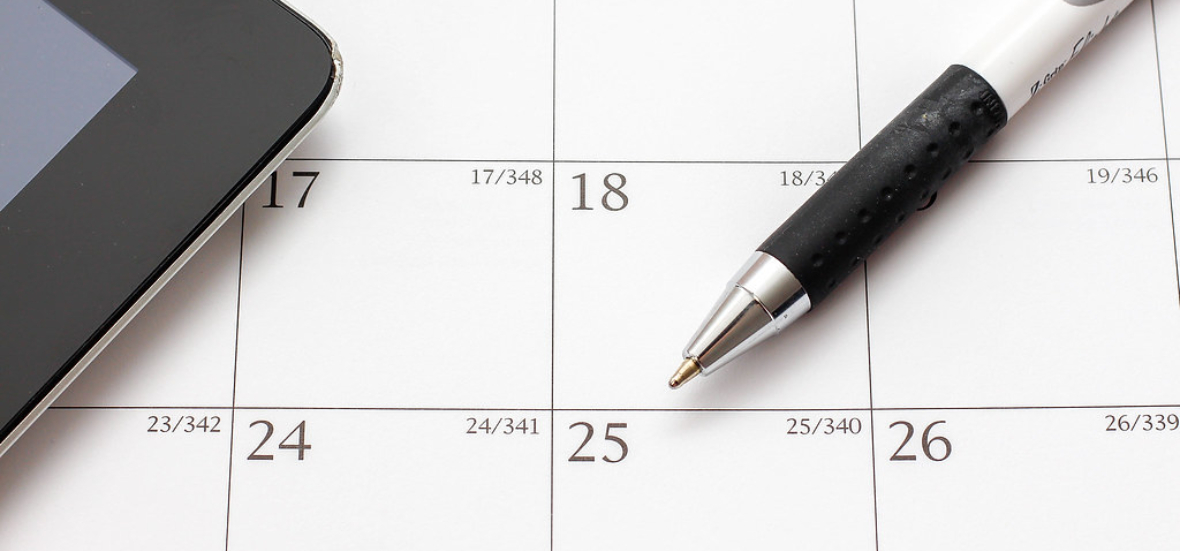
[caption id="attachment_172118" align="aligncenter" width="1180"] Image by Marco Verch (2017), Flickr.com, CC BY 2.0[/caption]
Image by Marco Verch (2017), Flickr.com, CC BY 2.0[/caption]
Flávia Ghelardi writes from Brazil in English and Portuguese. Jump to the Portuguese version of this post.
We usually associate the word "routine" with something monotonous that we often want to "get away from." However, a well-structured routine helps us to organize our lives and not waste time. Time is the most precious gift we receive from God (after the gift of our life). After it passes, we cannot go back and the only time we really have is now. Yesterday is gone and we don't know if tomorrow will come.
For children, especially younger ones, having a routine with fixed times for the various activities of the day, such as waking up, bathing, eating, playing, and sleeping, helps to provide security, they are less anxious because they know what will happen next. For the older ones and teenagers, following a routine is essential for them to learn how to organize their time and better enjoy their moments of study and leisure.
Those who do not have a routine are always running, troubled, wanting to do everything at the same time -- and arrive at the end of the day with the feeling that they have been unable to do anything they had planned. This creates a lot of frustration and discouragement. On the contrary, someone who has a schedule for each activity reaches the end of the day feeling the peace of duty accomplished.
Depending on your temperament, organizing and following a routine can be quite a challenge. It is necessary to start slowly and not be discouraged by failures. Start over with determination the next day. The suggestion is to organize a period of your day first, such as the morning. After you have accomplished this routine for a long time (a few weeks), then add the other periods (afternoon and evening).
What should be part of your routine?
The first thing to establish is a time to wake up. Then add your daily activities every half-hour. It is important to have times for meals, for prayers, for leisure/rest, and for physical activities. You can work out the routine for each day of the week, and it is not necessary for every day to be exactly the same. For example, you can schedule physical activity three times a week and do something else in this time in the other days of the week. It is also very important to establish the time you will sleep.
The ideal is that, after establishing the schedules, they are strictly adhered to, as long as you know exactly what you should do at each time of the day. Fr. José Kentenich speaks of “faithful and very faithful fulfillment of duty” and St. Josemaria Escrivá has a phrase that helps us focus on the routine: “Do what you owe and be in what you are doing.” That is, do what should be done at the time you set for yourself and, at that time, be 100% focused on that activity, without thinking or distracting yourself with what you did before or with what you will do next. In this way, you will do your duty faithfully.
A paradox of those who carry out their routine is that the more “slave” the person is to the established times, the more faithfully they comply, the more free they feel at the end of the day, knowing that they have done everything they should have done and at the moment that they should have done.
[tweet "The virtue behind a routine is the virtue of order."]
The virtue behind a routine is the virtue of order. Although it is not considered a “first greatness” virtue, those who do not strive to achieve it, end up not being able to practice others well. Without order, time is lost, life passes and we "are lived" instead of living.
In this time of quarantine and confinement that we are living, routine becomes essential even to maintain our psychological balance. So, I encourage everyone to have this experience, also with their children, because the sooner they learn to manage time, the freer they will be when they become adults.
A IMPORTÂNCIA DA ROTINA
Normalmente associamos a palavra “rotina” com algo monótono do qual muitas vezes queremos “fugir”. Porém, uma rotina bem estruturada nos ajuda a organizar as nossas vidas e não perdermos tempo. O tempo é o bem mais precioso que recebemos de Deus (depois do dom da nossa vida). Depois que ele passa, não podemos voltar atrás e o único tempo que realmente possuímos e o agora. O ontem já foi e o amanhã não sabemos se virá.
Para as crianças, principalmente as menores, ter uma rotina com horários fixos para as várias atividades do dia, como acordar, banho, refeições, brincadeiras e sono, ajuda a dar segurança, elas ficam menos ansiosas, pois sabem o que vai acontecer depois. Para as maiores e para os adolescentes, seguir uma rotina é essencial para aprenderem a organizar o seu tempo e aproveitar melhor os momentos de estudos e de lazer.
Quem não tem uma rotina, vive sempre correndo, atribulado, querendo fazer tudo ao mesmo tempo e chega ao final do dia com a sensação de que não conseguiu fazer nada do que havia planejado. Isso gera muita frustração e desânimo. Ao contrário, quem tem horário para cada atividade, chega ao fim do dia sentindo a paz do dever cumprido.
Dependendo do seu temperamento, organizar e cumprir uma rotina pode ser um grande desafio. É preciso começar aos poucos e não desanimar com as falhas. Recomeçar com determinação no dia seguinte. A sugestão é organizar primeiro um período do seu dia, como por exemplo, a parte da manhã. Depois que conseguir cumprir por um bom tempo (algumas semanas) essa rotina, então acrescente os outros períodos (tarde e noite).
O que deve fazer parte da rotina?
A primeira coisa a se estabelecer é um horário para acordar. Depois, acrescente a cada meia hora as atividades do seu dia. É importante ter horários para refeições, para orações, para lazer/descanso e para atividades físicas. Você pode elaborar a rotina de cada dia da semana, não sendo necessário que todos os dias sejam exatamente iguais. Por exemplo, pode colocar horário para atividade física três vezes na semana e fazer outra coisa nesse horário nos outros dias da semana. É muito importante também estabelecer o horário que vai dormir.
O ideal é que, após estabelecidos os horários, eles sejam rigorosamente cumpridos, na medida em que você saiba exatamente o que deve fazer em cada momento do dia. Pe. José Kentenich fala no “fiel e fidelíssimo cumprimento do dever” e S. Josemaria Escrivá tem uma frase que nos ajuda a focar na rotina: “Faze o que deves e estás no que fazes”. Ou seja, faça o que deve ser feito no horário que você mesmo estabeleceu e, naquele horário, esteja 100% concentrado naquela atividade, sem ficar pensando ou se distraindo com o que fez antes ou com o que irá fazer depois. Desta forma, cumprirá fielmente o seu dever.
Um paradoxo de quem cumpre a sua rotina é que quanto mais “escrava” a pessoa é dos horários estabelecidos, quanto mais fielmente cumpre os mesmos, mais livre se sente ao fim do dia, sabendo que fez tudo o que deveria ter feito e no momento em que deveria ter feito.
A virtude que está por trás da rotina é a virtude da ordem. Apesar de não ser considerada uma virtude de “primeira grandeza”, quem não se esforça para conquista-la, acaba por não conseguir também praticar bem as outras. Sem ordem, o tempo se perde, a vida passa e nós “somos vividos” ao invés de vivermos.
Nesse tempo de quarentena e confinamento que estamos vivendo, a rotina se torna fundamental até para mantermos nosso equilíbrio psicológico. Assim, incentivo a todos a fazerem essa experiência, também com os filhos, pois quanto antes aprenderem a gerenciar o tempo, mais livres serão quando se tornarem adultos.
Copyright 2020 Flávia Ghelardi
About the Author

Flávia Ghelardi
Flávia Ghelardi is the mom of four, a former lawyer already "promoted" to full time mom. Flávia published her first book FORTALECENDO SUA FAMÍLIA and is a member of Schoenstatt´s Apostolic Movement. Flávia loves to speak about motherhood and the important role of women, as desired by God, for our society. She blogs at www.fortalecendosuafamilia.blogspot.com.


.png?width=1806&height=731&name=CatholicMom_hcfm_logo1_pos_871c_2728c%20(002).png)
Comments